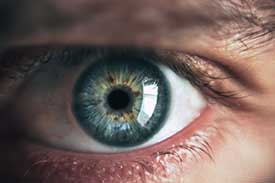Posted by: Philadelphia Eye Associates in Eye Health on April 26, 2019

While someone has likely told you to stop rubbing your eyes, they may not have mentioned that it is critical to stop smashing your pillow against your face and to stop sleeping with anything (be it a blanket or a hand) pushed up against your eyes at night. All of these cause microtrauma to the eyes and can worsen the disease.
Think about which side you sleep on at night. Odds are that your keratoconus (and vision) is worse in that eye!
Sleep apnea, or more specifically obstructive sleep apnea, is found at high rates in patients with keratoconus. This is a dangerous condition. You’ll actually stop breathing multiple times each night (sometimes hundreds of times). As you might imagine, a lack of oxygen to your body can cause many serious problems, including increasing your risk for weight gain, diabetes, depression, heart attacks, and stroke.
If you have any signs of sleep apnea, such as excessive fatigue, loud snoring, abrupt awakenings, gasping or choking at night, then get yourself a sleep study ASAP!
Patients with keratoconus are known to be at increased risk for developing retinal tears and retinal detachments. Be sure to have a dilated eye exam each year to check your retinal periphery. If you notice any changes to your vision such as new floaters or flickering and flashing lights, then get in to your eye doctor immediately.
Contact lenses have come a long way from the days of only rigid gas permeable lenses. While the old GPs still offer excellent vision in keratoconus to patients who can achieve a comfortable fit, there are now a wide arrays of newer technologies available. A skilled contact lens professional (such as Dr. Justin Sherman) can get almost any cornea fit and seeing well. There are now multiple scleral and mini-scleral lenses, hybrid lenses, custom soft lenses, and other custom lenses on the market designed for keratoconus patients.
If you are unhappy in your current lenses, do something about it. Go get fit with a newer technology! You deserve it. Better yet, go see if your medical insurance will help you pay for them.
Hopefully, your eye care doctor has told you about corneal collagen crosslinking. It is the only treatment proven to halt, or even improve, keratoconus. It is a minimally invasive in-office procedure that is incredibly effective.
While crosslinking works, if you let the disease advance too far, you will miss the window in which we can treat you. Corneas that develop scars or become too thin from the disease no longer qualify for safe treatment.
We are currently offering crosslinking for just $1600 (a huge discount over most other providers). So if you need treatment, come get evaluated now.
Dr. Brad H. Feldman is a board-certified, fellowship-trained ophthalmologist specializing in cornea transplantation, cataract surgery, and laser vision correction such as LASIK and PRK. Learn more about Dr. Feldman.
8025 Roosevelt Blvd.
Philadelphia, PA 19152